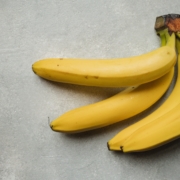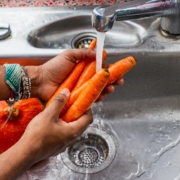Bananas…and Rats
By Bill Adler, MPH, RS
Technical Food Safety Consultant
It’s autumn. It’s cooler outside, and our need to sweat, to cool us off, isn’t quite as strong as it was just a couple of months ago. But we still sweat, and we cover it with deodorant to keep those around us from determining we’re just as human as they are.
Sweat in and of itself doesn’t stink. The bacteria in our armpits (and elsewhere) eat it and release the odor in their metabolic process. Sweat serves multiple purposes, but most of us know that we smell pretty ripe if we don’t cover it up or wash it off. As an endpoint, I know my shirts get stained, my wife comments on it, and some nice shirts now have permanent discolorations in the armpits. As creatures who like “nice” and “non-stinky,” we do our darndest to clean or at least cover our humanity in the shower and washing machine. Seriously, though, a hot shower with lots of lather sure feels good after a day of lawn raking or weed pulling or playing football with the kids. It’s invigorating, and it just feels good to get rid of the sweat and dirt and gunk that’s filled our pores and saturated our clothes.
Our food is the same way. If it isn’t quite right, we add salt or other condiments to enhance the flavor. Today, our much-manicured fruits and veggies produce their own ‘sweat’ in the form of insect-repelling chemicals. The theory is, I assume, that if they don’t taste good, they won’t have pests. But like sweat, if you don’t wash it off, it keeps on ‘keepin’ on.’ Rain takes some of it off, but certainly not all. And it lends itself to a bitter taste for those who wipe it on their pants before eating. So in modern agri-processing, much of our produce is waxed. The most frequent process is a dipping or spraying process that covers produce with an ultra-thin coating of wax that helps keep moisture loss to a minimum. With the distance between harvest and consumption frequently being months, this coating keeps produce feeling fresh. To have a salable commodity, processors have to protect against moisture loss, which is one way they do it.
A soapy shower makes us feel cleaner because we are. We should be washing produce for similar reasons. Removing the plant-produced protection, plus the sticky insecticides that are artificial, plus the moisture-holding waxes, gets us down to the actual product. A teaspoon of Life’s Pure Balance Fruit and Veggie Wash, in a gallon of water, for a 2-minute soak, followed by a quick rinse, will get you through the layers of gunk on your fruits and vegetables. For the sake of taste and cleanliness, this is all it takes to give you food that tastes good and is healthier for you.
Bill Adler is an expert in food safety, food-borne illnesses, and the foodservice inspection industry. He has conducted training for the Center for Disease Control and Prevention (CDC), teaching local, state, and federal disease investigators and working with laboratory specialists and epidemiologists. In addition, Bill has worked extensively with the Minnesota Department of Health (MDH) to perform food service inspections and train local and state public health employees.


